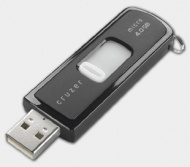|
'Smart drives' can make any computer your own Portable software may be
wave of the future for consumers, firms Lots of people own two or three
computers. But thanks to a powerful new technology anybody can make any
computer their own, just by plugging in a common digital device.
A new product called
MojoPac lets iPod users take control of any desktop computer running Microsoft
Corp.'s Windows XP operating system.
And major flash memory
makers like SanDisk
Corp. and Lexar
Media Inc. have begun making "smart" thumb drives that let
the user carry favorite software programs on the keyring-size devices.
When plugged into any Windows-based computer, the smart drive lets the
user work on a stranger's computer exactly as if it were his own, with all
the same software and settings.
"By the end of 2008,
people will install software on their smart drive, and not on their hard
drive," said Kate Purnal, chief executive of U3 LLC in Redwood City,
Calif., which markets one of the new smart drives.

If the new technology
catches on, companies would have greater flexibility in assigning
computers to employees.
Each machine could
contain only an operating system, such as Windows software. All other
programs would be loaded onto a smart drive, which the worker would keep
at all times and use on any computer in the office.
The smart drive can be
equipped with data encryption and password protection, to protect
sensitive data in case it is lost.
At home, every family
member could build a personalized computing environment on his or her own
smart drive, rather than the computer's hard drive. A brother could no
longer infect his sister's files with viruses; the family's avid gamer
wouldn't accidentally delete the income tax records.
Because smart drives are
relatively cheap -- a two-gigabyte drive from SanDisk costs around $60 --
family members could buy several, and use each for a specialized computing
task, from gaming to financial planning.
And forget about snooping
on each other. The smart drive technology stores all data in the portable
device. When the user unplugs the device, it leaves behind no traces.
Two Israeli companies,
Msystems Ltd. and Ceedo Technologies Ltd., independently developed smart
drive technology. SanDisk teamed up with Msystems to create a technical
standard called U3, while Lexar and Ceedo launched an alternate standard,
called PowerToGo.
U3 can't run Windows
applications without some modification. The company has worked with
software developers to produce dozens of programs that will run on U3
smart drives, including the popular Firefox Internet browser and the free
OpenOffice office software suite. But many popular Windows programs still
aren't available for U3, including the industry standard Microsoft Office.
Peter Carcione, senior
product marketing manager at Lexar, said his company's PowerToGo doesn't
need specially tailored software. "We are the only one to run real
Windows applications unmodified," he said.
For $30, users can buy an
add-on program called InstallAnything, which emulates the features of a
traditional hard drive loaded with Windows. Carcione said this lets
Lexar's smart drives support any standard Windows program.
Meanwhile, both Lexar and
SanDisk are facing a new competitor. RingCube Technologies Inc.'s new
MojoPac system works on thumb drives, or on any other storage device that
can plug into a computer's Universal Serial Bus (USB) port. That means it
can take advantage of hard drive-based storage devices like the larger Apple
iPods, which now come with up to 80 gigabytes of storage.
Joseph Unsworth,
principal analyst at Gartner
Inc., said that while smart-drive technology is now mainly being
targeted at consumers, it could chiefly benefit businesses, by providing a
secure technology for connecting portable drives to corporate data
networks. He said that companies could equip workers with U3 drives with
unique digital fingerprints, which could then be given trusted access to
sensitive data.
But Nam Hyung Kim,
principal analyst for iSuppli Corp. in El Segundo, Calif., warned that
neither consumers nor corporate users understand or trust the smart-drive
concept. "It will be very challenging to educate people," Kim
said.
|